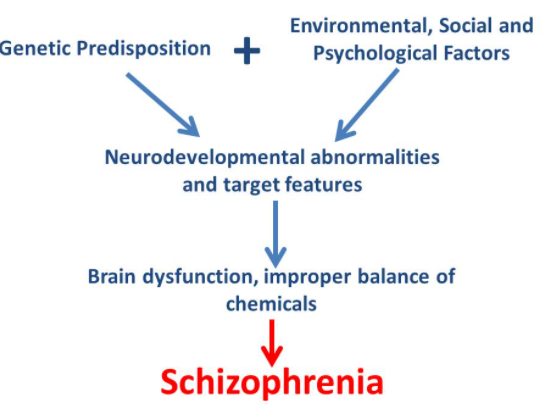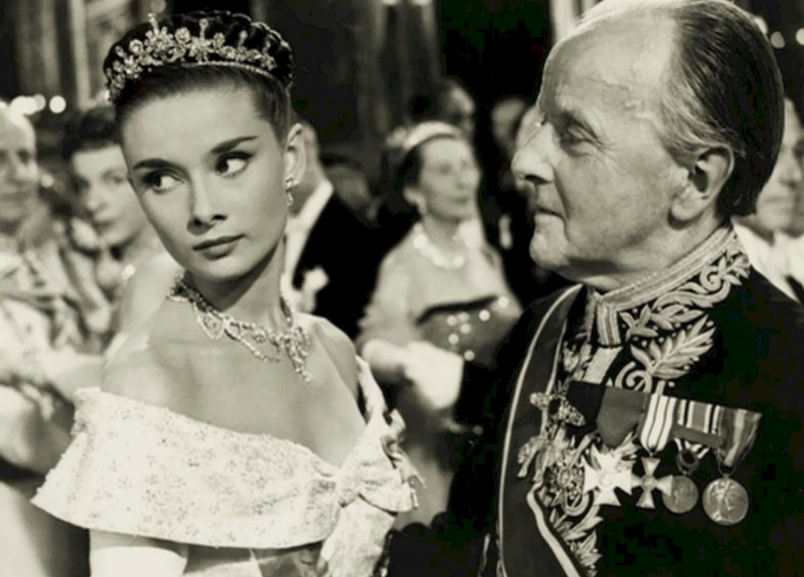Psychotic disorders
Psychotic disorders are often accompanied by psychosis which is a is a thought disorder and can show up predominantly as delusions or hallucinations.
- Delusions
- fixed false beliefs that are not consistent with the patient's cultural or religious beliefs.
Schizophrenia
A thought disorder with a large genetic component. Even though the genes have not yet been identified, twin studies have shown a significantly increased risk of schizophrenia.

- Symptoms
- Positive symptoms
- Are thought to be caused by dopamine excess (typical antipsychotics target this pathway better)
- Parkinson's disorder patients treated with dopamine can get delusions or hallucinations
- Types
- Delusions
- Hallucinations
- Negative symptoms
- Are thought to be caused by excess serotonin (atypical antipsychotics target this pathway better)
- Positive symptoms
- Diagnosis
- 2 or more of the following with at least 1 of 1-3
- Positive symptoms
- 1. Delusions - Persecution and grandiosity
- 2. Hallucinations - mostly auditory (drug-induced usually visual)
- 3. Disorganization of speech
- 4. Disorganization of behaviour
- Negative symptoms
- 5. Flat affect

- Limited speech or movement
- Anhedonia
- Cognitive delay with later onset
- 5. Flat affect
- Positive symptoms
- Duration
- 6 months or longer
- 2 or more of the following with at least 1 of 1-3
- Presentation
- Usually, these patients present with a psychotic break:
- When medications are stopped
- When the disease presents for the first time
- When the dose of medications need to be increased or the patient needs new medications
- Psychotic breaks reduce cognitive function
- Increased risk of dementia and earlier onset
- Age of onset for a first psychotic break
- In late teens or early 20s
- After a major stressor = growing up, moving out
- Initial symptoms may not be overt
- Rule out drugs in this age group
- Cocaine common
- Urine tox
- Duration and mood changes
- Usually, these patients present with a psychotic break:
- Treatment
- Lifelong treatment with antipsychotics
Brief psychotic disorder
- Symptoms
- Identical to schizophrenia after a major stressor (including giving birth to a baby)
- Diagnosis
- These usually last for at least 1 day but less than 1 month
- Treatment
- Treatment for 1 month
- If psychosis does not stop = more likely to be schizophrenia
Schizophreniform disorder
- Symptoms
- Identical to schizophrenia
- Diagnosis
- Symptoms for more than 1 and less than 6 months
- Treatment
- Treatment 3-6 months in duration
- If symptoms persist beyond 6 months, will require lifelong treatment = schizophrenia
Schizoaffective disorder
- Symptoms
- Predominantly psychotic symptoms with mood symptoms secondary
- Treatment
- Treat the mood disorder first
Mood disorder with psychotic features
- Symptoms
- Mostly mood disorder with some psychosis
- Treatment
- Treat the mood disorder first
Delusional disorder

- Symptoms
- Non-bizarre(but unrealistic) delusion with no impairment
- E.g. falling in love with celebrities and thinking that they love you too
- Treatment
- Gentle confrontation
- Show them that the delusion if wrong
- No medical treatment
All information provided on this website is for educational purposes and does not constitute any medical advice. Please speak to you doctor before changing your diet, activity or medications.

